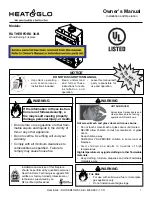
GAS PIPING AND GAS PRESSURE REQUIREMENTS
All gas piping must be installed to comply with local codes, or, in the absence of local
codes, with the latest edition of the National Fuel Gas Code ANSI Z223.1.
Unions in gas lines shall be of ground joint type. Compounds used on threaded joints of
gas piping must be resistant to the action of liquefied petroleum gas. Gas piping must
be of sufficient size to provide a minimum natural gas pressure at the appliance of 7"
water column or 11" for L.P. gases for the purpose of input adjustment. The maximum
inlet gas pressure to the unit must not exceed 10" for natural gas, and 13" for LP gases.
If this unit is to be supplied with LP gas (bottled propane)the tank or bottle supplying the
gas must have a regulator that reduces the gas pressure to between 11 and 13 inches
water column. The control will not operate with gas line pressure directly from the tank
and may leak gas due to this excessive pressure.
DANGER: OPERATION OF THIS UNIT ON LP GAS WITHOUT AN
APPROVED REGULATOR AT THE SUPPLY CONTAINER WILL LEAD TO GAS LEAKS
AT THE CONTROL WITH POSSIBLE FIRE OR EXPLOSION.
Include a manual shut-off valve and union in the line so the control or heater may be
disconnected for servicing. Include a drip leg and a plugged 1/8" N.P.T. tapping into the
line also. The tapping must be accessible for the test gauge connection immediately
upstream of the gas supply connection to the unit. Use a soap and water solution or
liquid gas leak detector to coat each joint in the piping system and look for bubbles
which indicate gas leaks. Repair all gas leaks.
CAUTION: THE APPLIANCE AND ITS APPLIANCE MAIN GAS VALVE MUST BE
DISCONNECTED FROM THE GAS SUPPLY PIPING SYSTEM DURING ANY
PRESSURE TESTING OF THAT SYSTEM AT TEST PRESSURES IN EXCESS OF
1/2 PSI (3.5 KPA).
THE APPLIANCE MUST BE ISOLATED FROM THE GAS SUPPLY PIPING SYSTEM
BY CLOSING THE EQUIPMENT SHUTOFF VALVE DURING ANY PRESSURE
TESTING OF THE GAS SUPPLY PIPING SYSTEM AT TEST PRESSURES EQUAL TO
OR LESS THAN 1/2 PSI (3.5KPA).
DANGER: DO NOT USE CANDLES, MATCHES OR OTHER IGNITION SOURCES
WHEN CHECKING FOR LEAKS. FUEL GASES ARE VERY FLAMMABLE AND IN
CERTAIN CONCENTRATIONS, EXPLOSIVE . CHECKING FOR LEAKS WITH AN
OPEN FLAME MAY LEAD TO FIRE OR EXPLOSION.
5




































